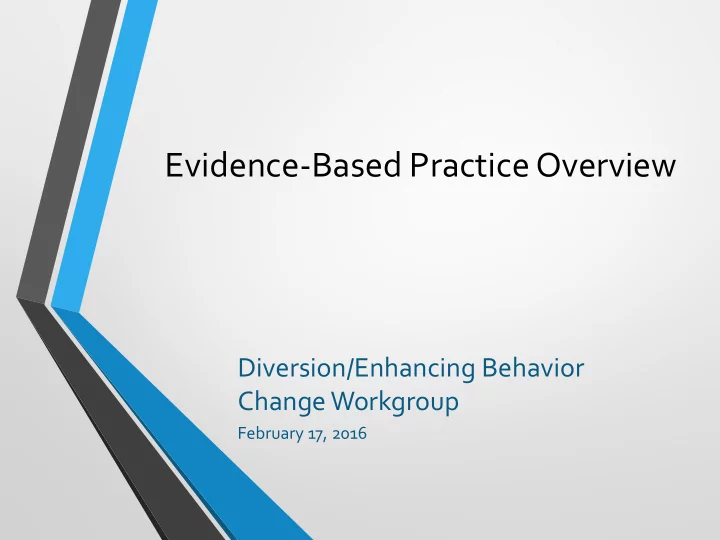

Evidence-Based Practice Overview Diversion/Enhancing Behavior Change Workgroup February 17, 2016
Defining Evidence-Based Practices in Criminal Justice... Evidence-Based Knowledge: Conclusions drawn from rigorous research studies that have been replicated numerous times with defined, measurable outcomes about the effectiveness of an intervention or process Evidence-Based Practices: The application of empirical research to professional practice Evidence-Based Principles : The eight “principles” of evidenced - based practices that have been derived from the research on risk reduction From: Implementing Evidence-Based Practices: Coaching Packet. Frequently Asked Questions: Evidence-Based Practices in Criminal Justice Settings http://www.cepp.com/documents/Implementing%20Evidence%20Based%2 0Practices.pdf
Defining Evidence-Based Practices in Criminal Justice... “ Evidence-Based Practices (EBP) are approaches which have been empirically researched and proven to have measureable positive outcomes.” 1 …………………………………………………….. “Evidence -Based Practice (EBP) is the body of research and replicable [clinical] knowledge that describes contemporary correctional assessment, programming and supervision strategies that lead to improved correctional outcomes such as the rehabilitation of offenders and increased public safety. Such principles not only meet the public’s expectations for quality, efficiency, and effectiveness but also reflect fairness, public safety and accountability.” 2 1 Frequently Asked Questions: Evidence-Based Practices in Criminal Justice Settings http://www.caction.org/CAN-Issue-Area- Groups/Reentry_Roundtable/CJP_EBP_FAQ.pdf 2 Evidence-based Practice: Principles for Enhancing Correctional Results in Prisons Author: Ralph C. Serin http://static.nicic.gov/Library/023360.pdf
Defining Evidence-Based Practices continued... “Evidence -based practice refers to the use of research and scientific studies as a base for determining the best practices in a field.” …………………………………………………….. ”Evidence -Based Practice is the partnership between research and practice. Research is used to measure how effective a practice is at achieving certain outcomes or goals - in the case of the criminal justice system - reduction of recidivism and increasing public safety .”
What is Evidenced-Based?... Evidence helps staff form informed decisions or judgments It is an outward sign rather than intuition The most reliable form of evidence is empirical, based on well designed studies. Anecdotal evidence is the least reliable form of evidence. From: Frequently Asked Questions: Evidence-Based Practices in Criminal Justice Settings http://www.caction.org/CAN-Issue-Area-Groups/Reentry_Roundtable/CJP_EBP_FAQ.pdf
Research Support Gradient -Experimental/control design Gold Taken from work done by -Significant sustained results Brad Bogue “Implementing Effective Correctional -Multiple site replications Management of Offenders In the Community” -Quasi-experimental control Silver NIC/The Crime and Justice Institute, May 4, 2004 -Significant sustained results -Multiple site replications -Matched comparison groups Bronze -Significant sustained results -Multiple site replications Iron -Conflicting findings -Inadequate research design Dirt- Conclusive that it doesn’t work
What is the Difference Between Evidence- Based Practices and Promising Practices? Evidence-Based Practices Promising Practices • • Emphasis on empirical Conventional wisdom, initial results research look promising • • Control of variables through Repeatable procedures that have random assignment proven themselves over time • • Consistency of findings Not necessarily proven through rigorous research • • Cross-site replication Sporadic replication From: Frequently Asked Questions: Evidence-Based Practices in Criminal Justice Settings http://www.caction.org/CAN-Issue-Area-Groups/Reentry_Roundtable/CJP_EBP_FAQ.pdf
What are Effective Practices? • RISK Principle (WHO) - Focus resources on the individuals who are most likely to reoffend.
What are Effective Practices? • NEED Principle (WHAT) -Target the criminogenic needs of moderate and high risk offenders (i.e. the dynamic risk factors that, when changed, will change the probability of an offender’s recidivism)
Criminogenic Needs • Top Four • Lesser Four • Cognition (pattern of • Substance abuse antisocial thinking/beliefs) • Employment (lack of • Personality factors (e.g., success at work; little coping, self-control, desire to work) problem solving • Education (lack of success • Associates (hanging at school; little desire for around peers who get into school) trouble) • Leisure (lack of • Family/marital issues (lack appropriate recreational of support/accountability) outlets)
Non-Criminogenic • Self-esteem • Personal distress • Learning disability • Health issues • Mental health
What are Effective Practices? • RESPONSIVITY Principle (HOW) - Design efforts around behavioral and cognitive-behavioral techniques. Tailor efforts to the individual abilities (strengths), style, culture, motivation, and personality.
What are Effective Practices? • FIDELITY Principle (HOW WELL) - Is the program being delivered as designed?
Eight Guiding Principles For Risk/Recidivism Reduction 14 From Evidence Based Practice in Corrections Presented by Justice System Assessment and Training through Funding from the National Institute of Corrections
Recommend
More recommend